AS AUTHOR
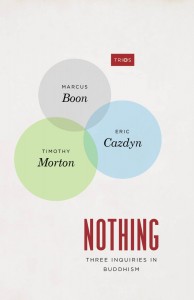 Nothing: Three Inquiries in Buddhism (University of Chicago, 2015). Written with Eric Cazdyn and Timothy Morton.
Nothing: Three Inquiries in Buddhism (University of Chicago, 2015). Written with Eric Cazdyn and Timothy Morton.
The University of Chicago Press published Nothing: Three Inquiries in Buddhism and Critical Theory, by Eric Cazdyn, Timothy Morton and myself, in their Trios series in Fall 2015. As with other books in the Trios series, the book consists of three longish (25,000 words plus!), quantum entangled essays, in this case exploring the relationship, or lack thereof, between Buddhism and Critical Theory. My own essay is entitled “To Live in a Glass House is a Revolutionary Virtue Par Excellence: Buddhism, Marxism and the Politics of Non-Alignment.” Although Buddhism played an important role in In Praise of Copying, especially in terms of rethinking the meaning of practices of copying, this essay is a more direct attempt to write about what Buddhism means to me today, and what role it can play in twenty-first century critical thought.
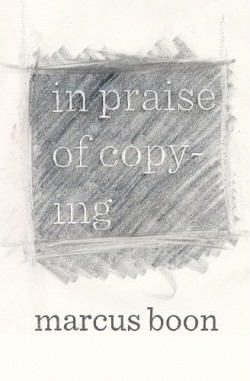 In Praise of Copying (Harvard University Press, 2010).
In Praise of Copying (Harvard University Press, 2010).
Free pdf of complete text | Chapter 1 excerpt at PopMatters
My second full length book, In Praise of Copying, is devoted to a deceptively simple but original argument: that copying is an essential part of being human, that the ability to copy is worthy of celebration, and that, without recognizing how integral copying is to being human, we cannot understand ourselves or the world we live in. [Read more]
Select Praise for In Praise of Copying
“Too important, and too ambitious, to ignore…” — Jess Row, The New Republic
“In some ways the disarming modesty and accessibility of Boon’s prose—something of a rarity in contemporary scholarship in the humanities that issues from academic presses—disguises its profound ambition. In Praise of Copying ranges widely in its interests and seriously and knowledgeably invokes the Western metaphysical tradition, contemporary post-structuralist theory, and the tradition of Mahayana Buddhism to suggest that commonplace distinctions between ‘genuine’ and ‘fake’ or ‘original’ and ‘copy’ compromise rather than enable a comprehensive and responsible understanding of ourselves and the world around us.” — James Williams, PopMatters
“A rich and contextual history of copying—with philosophical, etymological, and even biological threads…” — Jane Kim, Colombia Journalism Review
For a full list of reviews, articles, and audio about the book, click here.
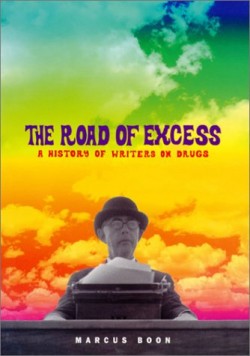 The Road of Excess: A History of Writers on Drugs (Harvard University Press, 2005).
The Road of Excess: A History of Writers on Drugs (Harvard University Press, 2005).
The Road of Excess began as my doctoral dissertation in the Comparative Literature department at New York University. I had been working with community based AIDS research groups, helping to write protocols for studies of promising anti-HIV drugs and I had the idea of applying the idea of a “literature review”, used in medical studies to show the history of research on a drug, to psychoactive or recreational drugs and the writers who’d used them. I was interested in seeing if literary accounts of drug use gave a consistent account of the effects of drugs like marijuana or opium over time — or if the meaning of a particular chemical substance was also “socially constructed” and changed over time, with users’ experiences reflecting the historical situation in which these experiences occurred. [Read more]
Select Praise for The Road of Excess
“Theory-afflicted but nonetheless lively …” — John Lancaster, The New Yorker
“Writers have been taking drugs as long as there have been drugs to be had, and—as we learn from Marcus Boon’s fascinating and meticulous The Road of Excess—the line is blurred, in fact invisible, between those writers who take drugs to inflame or exalt their demons and those who simply need, in Aldous Huxley’s phrase, ‘a chemical vacation from intolerable selfhood’…” — James Parker, Boston Globe
“…in an era when critics warn that the literary monograph may soon die of
its own non-elevating dust, one can only laud Professor Boon for his
infinite resourcefulness.” — Carlin Romano, The Chronicle of Higher Education
For a full list of reviews, articles, interviews and audio about the book, click here.
AS EDITOR
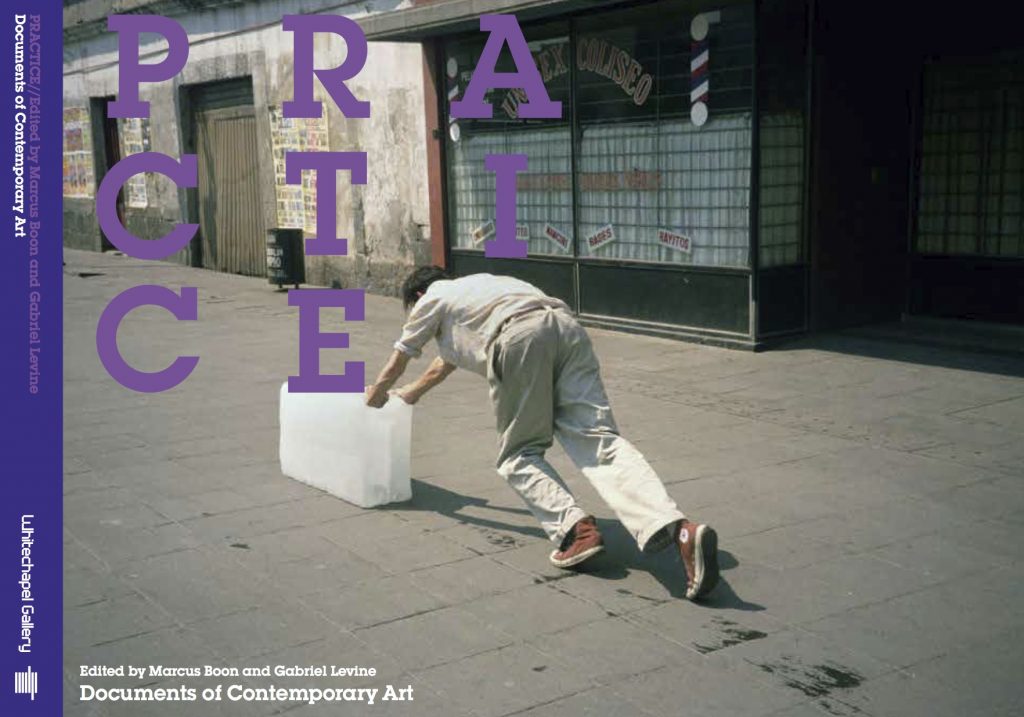 Practice, edited by Marcus Boon and Gabriel Levine). MIT Press/Whitechapel Gallery Documents of Contemporary Art series, 2018)
Practice, edited by Marcus Boon and Gabriel Levine). MIT Press/Whitechapel Gallery Documents of Contemporary Art series, 2018)
The first anthology to investigate what contemporary notions of practice mean for art, tracing their development and speculating on where this leads.
“Practice” is one of the key words of contemporary art, used in contexts ranging from artists’ descriptions of their practice to curatorial practice, from social practice to practice-based research. This is the first anthology to investigate what contemporary notions of practice mean for art, tracing their development and speculating on where this leads.
Reframing the question of practice offers new ways of reading the history of art and of evaluating particular forms of practice-based art. Once used to denote “doing,” as distinct from thinking and making, today the term can convey associations of political action (praxis), professional activity, discipline, or rehearsal, and signal a shift away from the self-enclosed artwork or medium to open-ended actions, series, processes, and projects. Although the turn to practice might promise freedom from finality or eventfulness, it also reflects the neoliberal pressures to train oneself, to perform, and to rehearse a marketable set of skills. This book offers an indispensible guide to the art history and theoretical framework of art-as-practice, clarifying the complex issues at stake in thinking about and enacting practice.
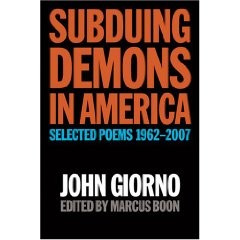
Subduing Demons In America: The Selected Poems of John Giorno (Soft Skull Press, 2009).
I first encountered John Giorno’s poetry in the early 1980s at the Final Academy, a celebration of William S. Burroughs life and work that happened in London. The next time was at a Tibetan Buddhist teaching in the space that was formerly Burroughs’ bunker on the Bowery in New York in the 1990s. John’s poetry moves freely in those spaces — the post-Beat world, avant New York, Tibetan Buddhism — and it’s changed my life and that of many others. Subduing Demons is the first career spanning collection of John’s work. I edited it, with full access to John’s work, and it contains many of John’s greatest poems, from the 1960s Pop/appropriation pieces such as “Constitution of the United States” to the psychedelic Buddhist pieces of the 1970s, to the hard hitting AIDS era slogan poems of the 1980s to outrageous recent pieces like “Thanx 4 Nothing”. [Read more]
Select Praise for Subduing Demons In America
“After scarfing up Subduing Demons in America, Giorno’s terrific new career-spanning collection, I discovered that in some ways I was right: sex, drugs and dharma are the main dishes on the table, along with violence, despair, and supernovas. But the meal itself proved to be as profound, unnerving, and hypnotic as the ritual repast that the chöd lamas offer to the hungry ghosts.” — Erik Davis, Techgnosis
“… the RZA of poetry …” — Brian Joseph Davies, EYE Weekly
For a full list of reviews, articles, interviews and audio about the book, click here.
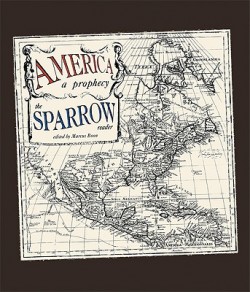 America: A Prophecy (Soft Skull Press, 2005).
America: A Prophecy (Soft Skull Press, 2005).
Sparrow is one of my oldest friends and one of the great trickster-poet-savants of New York. Although he’s mostly known for his poetry, his prose work is hilarious and astute, and I jumped at the chance to collect and edit this work, often published in fairly obscure places, for Soft Skull. [Read more.]
For a full list of reviews, articles, interviews and audio about the book, click here.